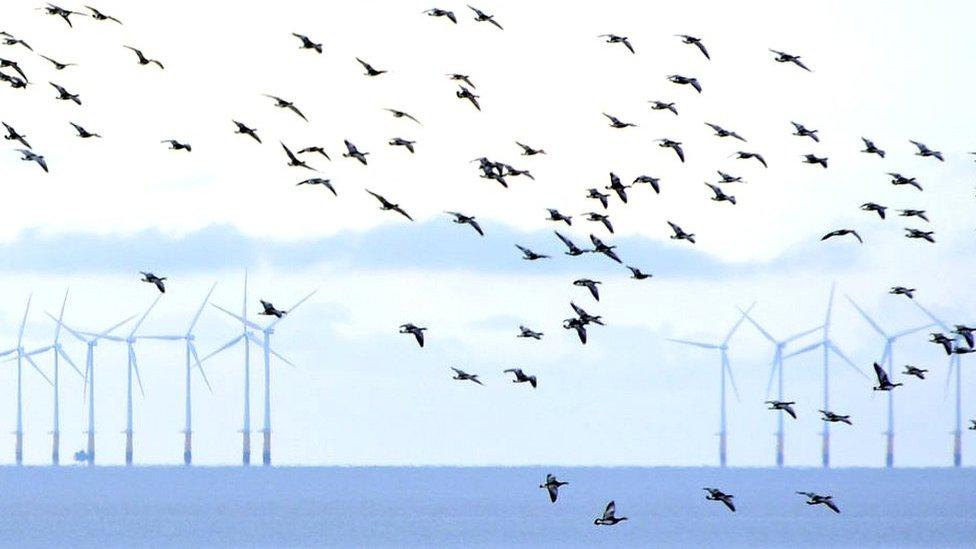Putin: Is he right about wind turbines and bird deaths?
- Published

Russian President Vladimir Putin has warned against over-reliance on renewable energy, something he says harms birds and other wildlife.
Speaking at a global manufacturing conference, the president said: "Wind-powered generation is good but are birds being taken into account in this case? How many birds are dying?"
"[Wind turbines] shake, causing worms to come out of the soil. This is not a joke," he said.
Estimating deaths
Research does suggest that wind power has led to birds and bats dying - in collisions with turbines or because of habitat loss.
We couldn't find any reference to worms.
It's hard to get at a definitive figure on how many birds are killed by wind turbines, though, and estimates vary.
Research from the London School of Economics, external (LSE) estimated in 2014 that by 2020 there could be anywhere between 9,600 and 106,000 bird deaths a year from wind energy in the UK - in other words, we're not sure.
It compared this with the estimated 55 million birds killed by domestic cats in the UK each year.
Studies looking at the US have put the figure at anywhere from fewer than 10,000 to more than 500,00.
We were unable to find any studies looking particularly at Russia.
But it's not only wind power that harms wildlife.
Wind v fossil fuels
A study published in 2009 looking at the US and Europe, external estimated that wind farms were responsible for about 0.3 bird deaths for every 1GWh of electricity generated, compared with 5.2 deaths per 1GWh caused by fossil-fuelled power stations.
It said this would equate to the deaths, every year, in the US, of about 7,000 birds caused by wind turbines, 300,000 by nuclear plants and 14.5 million by power plants using fossil fuels.
It's a fairly old study so this may have increased with the growth of wind power in the US or decreased with better understanding of how to mitigate the risks.
Another study in 2012 came to a similar conclusion, external, finding that fossil-fuel powered plants killed birds during mining, through onsite collision, electrocution with plant equipment and poisoning.
Whatever the exact number, and how it compares with fatalities at fossil fuel plants, it's generally considered that any harm to birds could be mitigated by locating wind farms away from major migration routes and feeding, breeding and roosting spots.
The UK-based Royal Society for the Protection of Birds (RSPB) says that if this is done, wind farms will have "minimal impacts".
It says that there is a far greater long-term threat to birds and other wildlife - climate change. And it recognises the role of renewable energy in tackling this.
According to the LSE's Research Institute on Climate Change and the Environment, "the benefits for wildlife of mitigating climate change are considered by conservation charities... to outweigh the risks, provided that the right planning safeguards are put in place, including careful site selection".
It also points out that the number of birds killed by wind turbines pales in comparison to those killed by cats or traffic - although wind turbines are more likely than cats or traffic to affect rarer, more endangered birds.

President Putin's message followed news that Russia would ratify the international Paris agreement, and came fresh on the heels of meeting world leaders, including Theresa May, at the G20 summit to discuss climate change.
He may have had other things in mind than the plight of birds when he made this comment, though.
Russia is a major producer of non-renewable fuels such as oil and gas.
These make up about 60-70% of Russian exports and the income from them funds about 40-50% of its budget.
A decree issued by Mr Putin, external in May described the development of green technologies as a "threat to economic security".
And, as you can see in the table above, it gets a tiny proportion of its energy from wind.